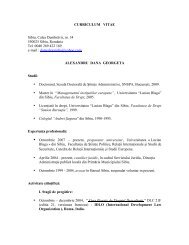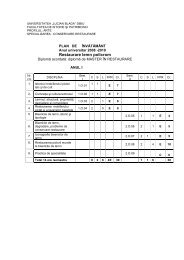Download - Facultatea de Științe Socio-Umane - Universitatea ...
Download - Facultatea de Științe Socio-Umane - Universitatea ...
Download - Facultatea de Științe Socio-Umane - Universitatea ...
You also want an ePaper? Increase the reach of your titles
YUMPU automatically turns print PDFs into web optimized ePapers that Google loves.
186<br />
Florin Nicolae ARDELEAN<br />
status 9 . Another crime sanctioned by the medieval military legislation of the<br />
Hungarian kingdom was the forced occupation of noble and priest houses. The<br />
punishment for such a transgression was not pre-established. These minor matters<br />
were left for the captains of the army to judge 10 .<br />
Although the autonomous principality inherited a significant amount of legislation<br />
and the institutional structure from the period of the voievodat, changes started to<br />
happen in the second part of the XVI century, even regarding military regulations.<br />
Some of the authoritarian rulers of Transylvania managed to impose their will in the<br />
political confrontation with the estates. One of them was Stephen Báthory (1571-1576<br />
ruler of Transylvania and from 1576 to 1586 king of the Polish-Lithuanian<br />
Commonwealth and Transylvanian prince), who effectively controlled the internal<br />
and external politics of the principality during his reign. Dating from his period we<br />
have two military regulations elaborated after he was elected to the Polish-Lithuanian<br />
throne, regulations that were also applied to his Transylvanian troops. The first set of<br />
rules dates from 1577, when the army of Báthory was besieging the town of Danzig.<br />
This elaborated regulation follows three major aspects: the discipline of the soldiers,<br />
the organization and security of military camps and the non-fighting auxiliary groups<br />
that followed the army. This regulation tired to impose some severe measures of<br />
discipline:<br />
Soldiers receiving regular payment were not allowed to leave the<br />
camp for plun<strong>de</strong>r forays. They were not allowed to take servants of other<br />
members of the army into their service. Each had to obey the or<strong>de</strong>rs of the<br />
king with no opposition.<br />
If someone stole food, clothes or other objects belonging to other<br />
soldiers was punished with <strong>de</strong>ath by hanging.<br />
Fights between soldiers insi<strong>de</strong> or outsi<strong>de</strong> the camp were forbid<strong>de</strong>n.<br />
Those who neglected this rule and caused injuries were punishable by <strong>de</strong>ath,<br />
if the fight took place without the use of weapons the aggressors had their<br />
arms cut.<br />
All infantry and cavalry officers received a written password and, if<br />
asked, they were obliged to communicate it to the comman<strong>de</strong>rs of the guards<br />
(campiductore).<br />
Soldiers in camp had to obey the signals given by drums and<br />
trumpets of their own unit.<br />
Starting a fire insi<strong>de</strong> the camp, intentionally or by mistake, was<br />
punishable by <strong>de</strong>ath.<br />
Moving chariots or other transportation means insi<strong>de</strong> the camp<br />
was forbid<strong>de</strong>n.<br />
The innkeepers and other merchants were forbid<strong>de</strong>n to enter the<br />
camp receiving special places on the outskirts.<br />
Slaughtering cattle and sheep insi<strong>de</strong> the camp was forbid<strong>de</strong>n.<br />
9<br />
Corpus Juris Hungarici, Tom I, Budae, 1882, Decretum Secundum, Budae Anno Domini 1454, art. 13,<br />
p. 202.<br />
10<br />
Ibi<strong>de</strong>m, Ludovicus II, Decretum Anno 1525, art. 22, p. 332.





